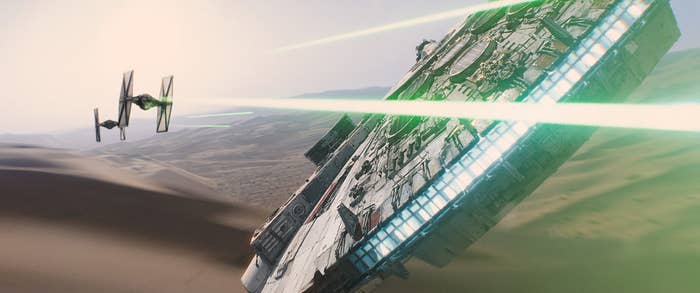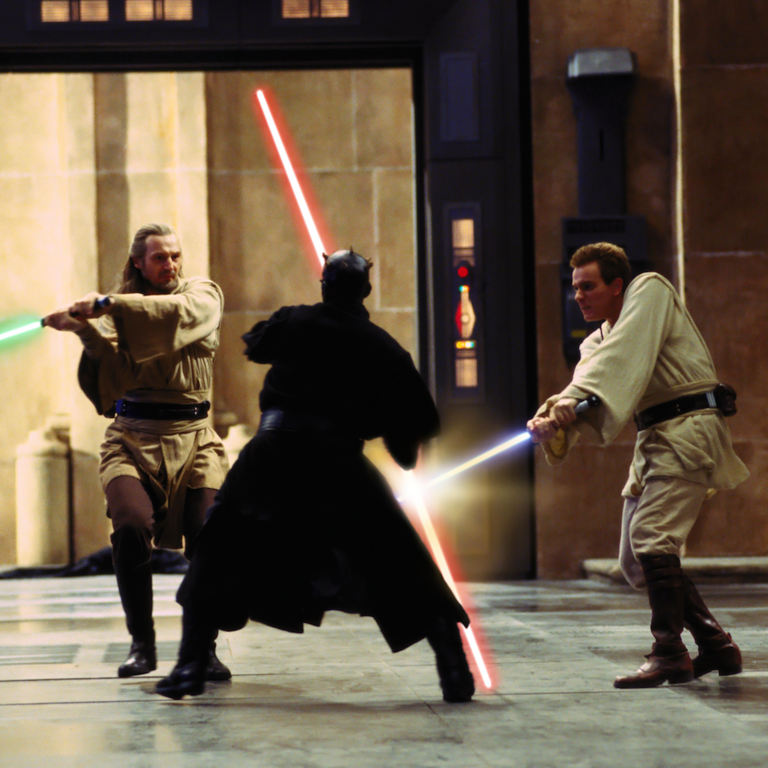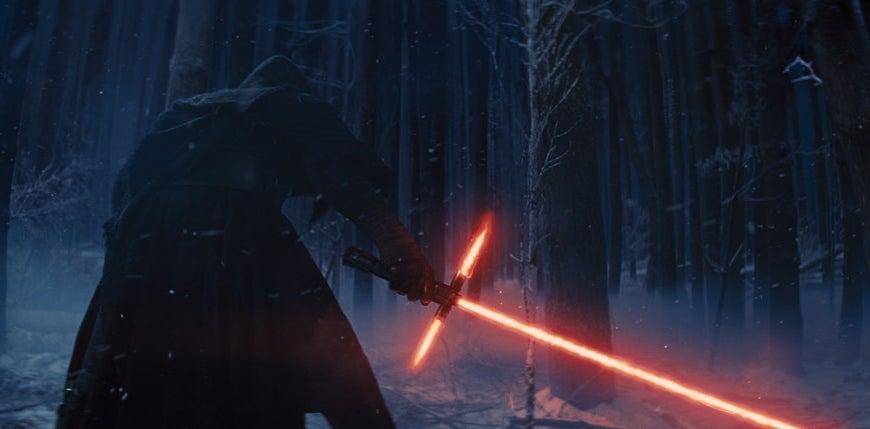
"Dude, come here, you're going to want to see this."
My kid pulled his face cheek-to-cheek with mine and I tapped the phone screen to hit play. He had just spent hours yesterday on a long cross-country flight watching Star Wars: Rebels, fully engrossed in Darth Squizzle or Crash Bandicoot or whoever these new cartoon characters were that existed in some vaguely canonical but unrecognizable corner of the galaxy, and 88 seconds later — not that anyone was counting — it was over and he walked away and did something else. By the time The Force Awakens comes out next year, he will be the same age I was when Star Wars came out; this movie and its ensuing franchise onslaught are, I thought, literally made for him. But buying wholly into that might be a bit of a defense mechanism.
Certainly J.J. Abrams could have poured it on by dramatically revealing familiar faces, and the internet would have broken in ways Paper magazine could only have dreamed of. Leading with new faces, even in a teaser like this, is a statement unto itself that he's not going for the easy nostalgia. Rather, the teaser is a dog whistle in more subtle ways: the orange of the desert, the dirt and rust on an X-wing, and more crucially, the howl of the TIE fighters and the swelling of the John Williams score, which apparently can raise goose bumps by merely typing a reference to it. The final moment of the trailer is not an image, but the distinctive hum of a lightsaber.
These are more powerful cues than faces, and they're hopelessly embedded in the DNA of people of a certain age who maybe think they should know better. The ease of these cues' effectiveness is nothing short of embarrassing; Abrams knows the power of what he's holding and knows to only dole out a drop of it for now. Making two Star Trek movies prepared him for navigating a fully mobilized geek gauntlet, but that may not have brought the same baggage that this does. We can grow up and grow old and think ourselves past certain things, then the whoosh of a fake laser sword pulls us inescapably back, like some sort of giant totemic emotional — oh fuck it, it's like a tractor beam.


In 1998, I was back in school, attempting to defeat the empire of adulthood using the Jedi mind trick of attainable student loans. I skipped class on a Friday to see the first showing of The Siege somewhere in Los Angeles, solely because of the trailer preceding it. That brief teaser also delivered enough of these sonic and visual cues as targeted strikes on neural sensors thought well-hidden, and a generation that was already hampered by maturity issues gave up and gave in.
A year later, trudging dejectedly out of the theaters on The Phantom Menace's opening night, they — we — were finally released: Silly twentysomethings, we thought to ourselves, prequels are for kids. I remember watching groups of friends standing in clusters outside the theater trying to make sense of what they'd just seen, and the collective sigh was more penetrating than anything Star Wars' sound guru Ben Burtt could have designed. If the lobby of the Vista Theater had stacks of law school applications, I would have grabbed as many as I could have carried. This is my last concrete memory of anything related to those three movies, each of which I saw in a theater opening night with diminishing expectations every three years, and then never again. The fact that this can be interpreted as some sort of cultural brag is a pretty good indicator of what Star Wars has come to mean since — lingua franca more than actual works of entertainment.
Yet the idea of these sequels, or reboots, or corporate synergy tentpole activators, being able to bridge the gap between cynical nostalgia play and low-hanging kid-bait, of being something that can still be taken in anew and enjoyed on its own merits rather than just for the synapses it may trigger, feels...exciting? Am I using that word correctly? There is a thrill to using the vocabulary of something we know and loved to create something new that doesn't feel like kabuki, that doesn't feel like pandering, even if it's maybe kinda sorta pandering.
We have 13 more months of leaks and spoilers and of undulating elevated and dashed expectations, 13 more months to hone our over-it posture, and we can all meet then and lament about how we were fooled again. Even this morning, the reaction cycle happened with exhausting, if totally unsurprising, quickness, from anticipation to excitement to Jar Jar jokes to microscopic deconstruction and speculation to weary dismissal inside of an hour. But there was definitely a chunk somewhere in that span — 88 seconds, not that anyone's counting — that felt like a dare: What if we just, you know, liked this?

